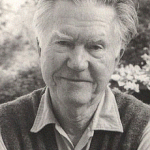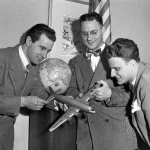Ambivalence on Remembrance Day: The old lie, Dulce est Decorum Est Pro Patria Mori
Obscene as cancer, bitter as the cud
Of vile, incurable sores on innocent tongues,
My friend, you would not tell with such high zest
To children ardent for some desperate glory,The old Lie; Dulce et Decorum est
Pro patria mori.
Dulce et Decorum est pro patria mori.
“How sweet and fitting it is to die for one’s country!” (the “old lie” first written by Horace).A Way of Writing by William Stafford
 A Way of Writing
A Way of Writing
by William Stafford
What can I witness about it? It remains mysterious, just as all of us must feel puzzled about how we are so inventive as to be able to talk along through complexities with our friends, not needing to plan what we are going to say, but never stalled for long in our confident forward progress. Skill? If so, it is the skill we all have, something we must have learned before the age of three or four.
- Writers may not be special or talented in any usual sense. They are simply engaged in sustained use of a language skill we all have. Their “creations” come about through confident reliance on stray impulses that will, with trust, find occasional patterns that are satisfying.
- But writing itself is one of the great, free human activities. There is scope for individuality, and elation, and discovery, in writing. For the person who follows with trust and forgiveness what occurs to him, the world remains always ready and deep, an inexhaustible environment, with the combined vividness of an actuality and flexibility of a dream. Working back and forth between experience and thought, writers have more than space and time can offer. They have the whole unexplored realm of human vision.
Two Good Voices in My Head. Two Pills: Red and Blue
In Marlowe’s Doctor Faustus, good and bad angels speak persuasively to Faustus. He chooses the path of adventure, exploration and experience.
Two voices, saying different and opposite things. It’s a more common experience than I had realised. Billy Graham had a crisis with two voices--reason and Charles Templeton; orthodoxy and Henrietta Mears. He chose to believe in the literal inspiration of the Scriptures. He moved upwards into fame and adulation. Templeton lost his faith, and ended up bitter, because you see, he really did love Jesus, and felt he had lost something.
Or pray, think, study scripture and think for myself? Encounter Scripture for myself. One is easy; one can be difficult and painful.
But, of course, if the truths of evangelical and Christian orthodoxy are the truth, they will withstand questioning. And Christ himself will withstand all questioning, of that I have no doubt!
Human Sacrifices: The Nature of Idolatry


When I was twenty-something, young and ambitious, I read this statement by Willa Cather, The God of Art demands human sacrifices.
A Tale of Two Evangelists–Belief in Inerrancy Makes All the Difference in the World

Christian theism must be rejected by any person with even a shred of respect for reason.
-George H. Smith, atheist [1]
Christian faith is not an irrational leap. Examined objectively, the claims of the Bible are rational propositions well supported by reason and evidence.
-Charles Colson, Christian [2]
William Franklin Graham steadied himself by gripping both sides of the podium. He was eighty years old, fighting Parkinson’s disease, but he stared intently at the throngs inside the RCA Dome in Indianapolis and spoke in a steady, forceful voice. There was no hint of hesitation, no uncertainty or ambiguity. His sermon was essentially the same simple and direct message he had been preaching for fifty years.
He referenced the chaos and violence around the world, and he zeroed in on the anguish, pain, and confusion in the hearts of individuals. He talked about sin, about forgiveness, about redemption, and about the loneliness, despair, and depression that weigh so many people down.
“All of us want to be loved,” he said in his familiar North Carolina cadence as he approached the conclusion of his talk. “All of us want somebody to love us. Well, I want to tell you that God loves you. He loves you so much that he gave us his Son to die on the cross for our sins. And he loves you so much that he will come into your life and change the direction of your life and make you a new person, whoever you are.
“Are you sure that you know Christ? There comes a moment in which the Spirit of God convicts you, calls you, speaks to you about opening your heart and making certain of your relationship to God. And hundreds of you tonight are not sure. You’d like to be sure. You’d like to leave here tonight knowing that if you died on the way home, you would be ready to meet God.”
So he urged them to come. And they did–at first, there was a trickle of people, and then the floodgates opened, with individuals, couples, and entire families pouring into the empty space in front of the platform. Soon they were shoulder-to-shoulder, the crowd wrapping around the sides of the stage, nearly three thousand in all. Some were weeping, gripped by somber conviction; others stared downward, still stewing in shame over their past; many were smiling from ear to ear–liberated, joyous…home, finally.
One married woman was typical. “My mom died of cancer when I was young, and at the time I thought I was being punished by God,” she told a counselor. “Tonight I realized that God loves me–it is something that I’ve known but couldn’t really grasp. Tonight a peacefulness came into my heart.”[3]
What is faith? There would have been no need to define it for these people on that sultry June night. Faith was almost palpable to them. They reached out to God almost as if they were expecting to physically embrace him. Faith drained them of the guilt that had oppressed them. Faith replaced despondency with hope. Faith infused them with new direction and purpose. Faith unlocked heaven. Faith was like cool water soaking their parched soul.
But faith isn’t always that easy, even for people who desperately want it. Some people hunger for spiritual certainty, yet something hinders them from experessing it. They wish they could taste that kind of freedom, but obstacles block their paths. Objections pester them. Doubts mock them. Their hearts want to soar to God; their intellects keep them securely tied down.
They see the television coverage of the crowds who have come forward to pray with Billy Graham and they shake their heads. If it were only that simple, they sigh to themselves. If only there weren’t so many questions.
For Charles Templeton–ironically, once Billy Graham’s pulpit partner and close friend–questions about God have hardened into bitter opposition toward Christianity. Like Graham, Templeton once spoke powerfully to crowds in vast arenas and called for people to commit themselves to Jesus Christ. Some even predicted Templeton would eventually eclipse Graham as an evangelist.
But that was a long time ago. That was before the crippling questions. Today Templeton’s faith–repeatedly punctured by persistent and obstinate doubts–has leaked away. Maybe forever.
Maybe.
FROM FAITH TO DOUBT
The year was 1949. Thirty-year-old Billy Graham was unaware that he was on the brink of being catapulted into worldwide fame and influence. Ironically, as he readied himself for his breakthrough crusade in Los Angeles, he found himself grappling with uncertainty–not over the existence of God or the divinity of Jesus but over the fundamental issue of whether he could totally trust what his Bible was telling him.
In his autobiography, Graham said he felt as if he were being stretched on a rack. Pulling him toward God was Henrietta Mears, the bright and compassionate Christian educator who had a thorough understanding of modern scholarship and and abounding confidence in the reliability of the Scriptures. Yanking him the other way was Graham’s close companion and preaching colleague, thirty-three-year-old Charles Templeton.[4]
According to Templeton, he became a Christian fifteen years earlier when he found himself increasingly disgusted with his lifestyle on the sports staff of the Toronto Globe. Fresh from a night out at a sleazy strip joint, feeling shoddy and unclean, he went to his room and knelt by his bed in the darkness.
“Suddenly,” he would recall later, “it was as though a black blanket had been draped over me. A sense of guilt pervaded my entire mind and body. The only words that would come were, ‘Lord, come down. Come down….'” And then:
After abandoning journalism for the ministry, Templeton met Graham in 1945 at a Youth for Christ rally. They were roommates and constant companions during an adventurous tour of Europe, alternating in the pulpit as they preached at rallies. Templeton founded a church that soon overflowed its 1,200-seat sanctuary. American Magazine said he “set a new standard for mass evangelism.”[6] His friendship with Graham grew. “He’s one of the few men I have ever loved in my life,” Graham once told a biographer.[7]
But soon doubts began gnawing at Templeton. “I had gone through a conversion experience as an incredibly green youth,” he recalled later. “I lacked the intellectual skills and the theological training needed to buttress my beliefs when–as was inevitable–questions and doubts began to plague me….My reason had begun to challenge and sometimes rebut the central beliefs of the Christian faith.”[8]
A TRIUMPH OF FAITH
Now, there was the skeptical Templeton, a counterpoint to the faith-filled Henrietta Mears, tugging his friend Billy Graham away from her repeated assurances that the Scriptures are trustworthy. “Billy, you’re fifty years out of date,” he argued. “People no longer accept the Bible as being inspired the way you do. Your faith is too simple.”
Templeton seemed to be winning the tug-of-war. “If I was not exactly doubtful,” Graham would recall, “I was certainly disturbed.” He knew that if he could not trust the Bible, he could not go on. The Los Angeles crusade–the event that would open the door to Graham’s worldwide ministry–was hanging in the balance.
Graham searched the Scriptures for answers, he prayed, he pondered. Finally, in a heavy-hearted walk in the moonlit San Bernardino Mountains, everything came to a climax. Gripping a Bible, Graham dropped to his knees and confessed hs couldn’t answer some of the philosophical and psychological questions that Templeton and others were raising.
“I was trying to be on the level with God, but something remained unspoken,” he wrote. “At last the Holy Spirit freed me to say it. ‘Father, I am going to accept this as Thy Word–by faith! I’m going to allow faith to go beyond my intellectual questions and doubts, and I will believe this to be Your inspired Word.'”
Rising from his knees, tears in his eyes, Graham said he sensed the power of God as he hadn’t felt for months. “Not all my questions were answered, but a major bridge had been crossed,” he
said. “In my heart and mind, I knew a spiritual battle in my soul had been fought and won.”[9]
For Graham, it was a pivotal moment. For Templeton, though, it was a bitterly disappointing turn of events. “He committed intellectual suicide by closing his mind,” Templeton declared. The emotion he felt most toward his friend was pity. Now on different paths, their lives began to diverge.
History knows what would happen to Graham in the succeeding years. He would become the most persuasive and effective evangelist of modern times and one of the most admired men in the world. But what would happen to Templeton? Decimated by doubts, he resigned from the ministry and moved back to Canada, where he became a commentator and novelist.
Templeton’s reasoning had chased away his faith. But are faith and intellect really incompatible? Is it possible to be a thinker and a Bible-believing Christian at the same time? Some don’t believe so.
“Reason and faith are opposites, two mutually exclusive terms: there is no reconciliation or common ground,” asserts atheist George H. Smith. “Faith is belief without, or in spite of, reason.”[10]
Christian educator W. Bingham Hunter takes the opposites view. “Faith,” he said, “is a rational response to the evidence of God’s self-revelation in nature, human history, the Scriptures and his resurrected Son.”[11]
For me, having lived much of my life as an atheist, the last thing I want is a naive faith built on a paper-thin foundation of wishful thinking or make-believe. I need a faith that’s consistent with reason, not contradictory to it; I want beliefs that are grounded in reality, not detached from it. I need to find out once and for all whether the Christian faith can stand up to scrutiny.
It was time for me to talk face to face with Charles Templeton.
FROM MINISTER TO AGNOSTIC
Some five hundred miles north of where Billy Graham was staging his Indianapolis campaign, I tracked Templeton to a modern high-rise building in a middle-class neighborhood of Toronto. Taking the elevator to the twenty-fifth floor, I went to a door marked “Penthouse” and used the brass knocker.
Under my arm I carried a copy of Templeton’s latest book, whose title leaves no ambiguity concerning his spiritual perspective. It’s called Farewell to God: My Reasons for Rejecting the Christian Faith. The often-acerbic tome seeks to eviscerate Christian beliefs, attacking them with a passion for being “outdated, demonstrably untrue, and often, in their various manifestations, deleterious to individuals and to society.”[12]
Templeton draws upon a variety of illustrations as he strives to undermine faith in the God of the Bible. But I was especially struck by one moving passage in which he pointed to the horrors of Alzheimer’s disease, describing in gripping detail the way it hideously strips people of their personal identity by rotting their mind and memory. How, he demanded, could a compassionate God allow such a ghastly illness to torture its victims and their loved ones?
The answer, he concluded, is simple: Alzheimer’s would not exist if there were a loving God. And because it does exist, that’s one more bit of persuasive evidence that God does not.[13] For someone like me, whose wife’s family has endured the ugly ravages of Alzheimer’s, it was an arguement that carried considerable emotional punch.
I wasn’t sure what to expect as I waited at Templeton’s doorstep. Would he be as combative as he was in his book? Would he be bitter toward Billy Graham? Would he even go through with our interview? When he had consented in a brief telephone conversation two days earlier, he had said vaguely that his health was not good.
Madeleine Templeton, fresh from tending flowers in her rooftop garden, opened the door and greeted me warmly. “I know you’ve come all the way from Chicago,” she said, “but Charles is very sick, I’m sorry to say.”
“I could come back another time,” I offered.
“Well, let’s see how he’s feeling,” she said. She led me up a red-carpeted staircase into their luxury apartment, two large and frisky poodles at her heels. “He’s been sleeping….”
At that moment, her eighty-three-year-old husband emerged from his bedroom. He was wearing a dark brown, lightweight robe over similarly colored pajamas. Black slippers were on his feet. His thinning gray hair was a bit disheveled. He was gaunt and pale, although he blue-gray eyes appeared alert and expressive. He politely extended his hand to be shaken.
“Please excuse me,” he said, clearing his throat, “but I’m not well.” Then he added matter-of-factly: “Actually, I’m dying.”
“What’s wrong?” I asked.
His answer almost knocked me on my heels. “Alzheimer’s disease,” he replied.
My mind raced to what he’d written about Alzheimer’s being evidence for the nonexistence of God; suddenly, I had an insight into at least some of the motivation for his book.
“I’ve had it…let’s see, has it been three years?” he said, furrowing his brow and turning to his wife for help. “That’s right, isn’t it, Madeleine?”
She nodded. “Yes, dear, three years.”
“My memory isn’t what it was,” he said. “And, as you may know, Alzheimer’s is always fatal. Always. It sounds melodramatic, but the truth is I’m doomed. Sooner or later, it will kill me. But first, it will take my mind.” He smiled faintly. “It’s already started, I’m afraid. Madeleine can attest to that.”
“Look, I’m sorry to intrude,” I said. “If you’re not feeling up to this…”
“I suppose you want me to explain how I went from the ministry to agnosticism,” he said. With that, he proceeded to describe the events that led to the shedding of his faith in God.
That was what I had expected. But I could never have anticipated how our conversation would end.
THE POWER OF A PICTURE
Templeton was fully engaged now. Occasionally, I could see evidence of his Alzheimer’s, such as when he was unable to recall a precise sequence of events of when he’d repeat himself. But for the most part he spoke with eloquence and enthusiasm, using an impressive vocabulary, his rich and robust voice rising and lowering for emphasis. He had an aristocratic tone that sounded nearly theatrical at times.
“Was there one thing in particular that caused you to lose your faith in God?” I asked at the outset.
He thought for a moment. “It was a photograph in Life magazine,” he said finally.
“Really?” I said. “A photograph? How so?”
He narrowed his eyes a bit and looked off to the side, as if he were viewing the photo afresh and reliving the moment. “It was a picture of a black woman in Northern Africa,” he explained. “They were experiencing a devastating drought. And she was holding her dead baby in her arms and looking up to heaven with the most forlorn expression. I looked at it and thought, ‘Is it possible to believe that there is a loving or caring Creator when all this woman needed was rain?‘”
As he emphasized the word rain, his bushy gray eyebrows show up and his arms gestured toward heaven, as if beckoning for a response.
“How could a loving God do this to that woman?” he implored as he got more animated, moving to the edge of his chair. “Who runs the rain? I don’t; you don’t. He does–or that’s what I thought. But when I saw that photograph, I immediately knew it was not possible for this to happen and for there to be a loving God. There was no way. Who else but a fiend could destroy a baby and virtually kill its mother with agony–when all that was needed was rain?“
He paused, letting the question hang heavily in the air. Then he settled back into his chair. “That was the climactic moment,” he said. “And then I began to think further about the world being the creation of God. I started considering the plagues that sweep across parts of the planet and indiscriminately kill–more often than not, painfully–all kinds of people, the ordinary, the decent, and the rotten. And it just became crystal clear to me that it is not possible for an intelligent person to believe that there is a deity who loves.”
Templeton was tapping into an issue that had vexed me for years. In my career as a newspaper reporter, I hadn’t merely seen photos of intense suffering; I was a frequent first-hand observer of the underbelly of life where tragedy and suffering festered–the rotting inner cities of the United States; the filthy slums of India; Cook County Jail and the major penitentiaries; the hospice wards for the hopeless; all sorts of disaster scenes. More than once, my mind reeled at trying to reconcile the idea of a loving God with the depravity and heartache and anguish before my eyes.
But Templeton wasn’t done. “My mind then went to the whole concept of hell. My goodness,” he said, his voice infused with astonishment, “I couldn’t hold someone’s hand to a fire for a moment. Not an instant! How could a loving God, just because you don’t obey him and do what he wants, torture you forever–not allowing you to die, but to continue in that pain for eternity? There is no criminal who would do this!”
“So these were the first doubts that you had?” I asked.
“Prior to that, I had been having more and more questions. I had preached to hundreds of thousands of people the antithetical message, and then I found to my dismay that I could no longer believe it. To believe it would be to deny the brain I had been given. It became quite clear that I had been wrong. So I made up my mind that I would leave the ministry. That’s essentially how I came to be agnostic.”
“Define what you mean by that,” I said, since various people have offered different interpretations of that term.
“The athiest says there is no God,” he replied. “The Christian and Jew say there is a God. The agnostic says, ‘I cannot know.’ Not do not know but cannot know. I never would presume to say flatly that there is no God. I don’t know everything; I’m not the embodiment of wisdom. But it is not possible for me to believe in God.”
I hesitated to ask the next question. “As you get older,” I began in a tentative tone, “and you’re facing a disease that’s always fatal, do you–“
“Worry about being wrong?” he interjected. He smiled. “No, I don’t.”
“Why not?”
“Because I have spent a lifetime thinking about it. If this were a simplistic conclusion reached on a whim, that would be different. But it’s impossible for me–impossible–to believe that there is any thing or person or being that could be described as a loving God who could allow what happens in our world daily.”
“Would you like to believe?” I asked.
“Of course!” he exclaimed. “If I could, I would. I’m eighty-three years old. I’ve got Alzheimer’s. I’m dying, for goodness sake! But I’ve spent my life thinking about it and I’m not going to change now. Hypothetically, if someone came up to me and said, ‘Look, old boy, the reason you’re ill is God’s punishment for your refusal to continue on the path your feet were set in’–would that make any difference to me?”
“He answered himself emphatically: “No,” he declared. “No. There cannot be, in our world, a loving God.”
His eyes locked with mine. “Cannot be.”
THE ILLUSION OF FAITH
Templeton ran his fingers through his hair. He had been talking in adamant tones, and I could tell he was beginning to tire. I wanted to be sensitive to his condition, but I had a few other questions I wanted to pursue. With his permission, I continued.
“As we’re talking, Billy Graham is in the midst of a series of rallies in Indiana,” I told Templeton. “What would you say to the people who’ve stepped forward to put their faith in Christ?”
Templeton’s eyes got wide. “Why, I wouldn’t interfere in their lives at all,” he replied. “If a person has faith and it makes them a better individual, then I’m all for that–even if I think they’re nuts. Having been a Christian, I know how important it is to people’s lives–how it alters their decisions, how it helps them deal with difficult problems. For most people, it’s a boon beyond description. But is it because there is a God? No, it’s not.”
Templeton’s voice carried no condescension, and yet the implications of what he was saying were thoroughly patronizing. Is that what faith is all about–fooling yourself into becoming a better person? Convincing yourself there’s a God so that you’ll become motivated to ratchet up your morality a notch or two? Embracing a fairy tale so you’ll sleep better at night? No, thank you, I thought to myself. If that’s faith, I wasn’t interested.
“What about Billy Graham himself?” I asked. “You said in your book that you feel sorry for him.”
“Oh, no, no,” he insisted, contrary to his writings. “Who am I to feel sorry for what another man believes? I may regret it on his behalf, if I may put it that way, because he has closed his mind to reality. But would I wish him ill? Not for anything at all!”
Templeton glanced over to an adjacent glass coffee table where Billy Graham’s autobiography was sitting.
“Billy is pure gold,” he remarked fondly. “There’s no feigning or fakery in him. He’s a first-rate human being. Billy is profoundly Christian–he’s the genuine goods, as they say. He sincerely believes–unquestionably. He is as wholesome and faithful as anyone can be.”
And what about Jesus? I wanted to know what Templeton thought of the cornerstone of Christianity. “Do you believe Jesus ever lived?” I asked.
“No question,” came the quick reply.
“Did he think he was God?”
He shook his head. “That would have been the last thought that would have entered his mind.”
“And his teaching–did you admire what he taught?”
“Well, he wasn’t a very good preacher. What he said was too simple. He hadn’t thought about it. He hadn’t agonized over the biggest question there is to ask.”
“Which is…”
“Is there a God? How could anyone believe in a God who does, or allows, what goes on in the world?”
“And so how do you assess this Jesus?” It seemed like the next logical question–but I wasn’t ready for the response it would evoke.
THE ALLURE OF JESUS
Templeton’s body language softened. It was as if he suddenly felt relaxed and comfortable in talking about an old and dear friend. His voice, which at times had displayed such a sharp and insistent edge, now took on a melancholy and reflective tone. His guard seemingly down, he spoke in an unhurried pace, almost nostalgically, carefully choosing his words as he talked about Jesus.
“He was,” Templeton began, “the greatest human being who has ever lived. He was a moral genius. His ethical sense was unique. He was the intrinsically wisest person that I’ve ever encountered in my life or in my readings. His commitment was total and led to his own death, much to the detriment of the world. What could one say about him except that this was a form of greatness?”
I was taken aback. “You sound like you really care about him,” I said.
“Well, yes, he’s the most important thing in my life,” came his reply. “I…I…I,” he stuttered, searching for the right word, “I know it may sound strange, but I have to say… I adore him!”
I wasn’t sure how to respond. “You say that with some emotion,” I said.
“Well, yes. Everything good I know, everything decent I know, everything pure I know, I learned from Jesus. Yes…yes. And tough! Just look at Jesus. He castigated people. He was angry. People don’t think of him that way, but they don’t read the Bible. He had a righteous anger. He cared for the oppressed and exploited. There’s no question that he had the highest moral standard, the least duplicity, the greatest compassion, of any human being in history. There have been many other wonderful people, but Jesus is Jesus.”
“And so the world would do well to emulate him?”
“Oh, my goodness, yes! I have tried–and try is as far as I can go–to act as I have believed he would act. That doesn’t mean I could read his mind, because one of the most fascinating things about him was that he often did the opposite thing you’d expect–“
Abruptly, Templeton cut short his thoughts. There was a brief pause, almost as if he was uncertain whether he should continue.
“Uh…but…no,” he said slowly, “he’s the most…” He stopped, then started again. “In my view,” he declared,” he is the most important human being who has ever existed.”
That’s when Templeton uttered the words I never expected to hear from him. “And if I may put it this way,” he said as his voice began to crack, “I…miss…him!“
With that, tears flooded his eyes. He turned his head and looked downward, raising his left hand to shield his face from me. His shoulders bobbed as he wept.
What was going on? Was this an unguarded glimpse into his soul? I felt drawn to him and wanted to comfort him; at the same time, the journalist in me wanted to dig to the core of what was prompting this reaction. Missed him why? Missed him how?
In a gentle voice, I asked, “In what way?”
Templeton fought to compose himself. I could tell it wasn’t like him to lose control in front of a stranger. He sighed deeply and wiped away a tear. After a few more awkward moments, he waved his hand dismissively. Finally, quietly but adamantly, he insisted: “Enough of that.”
He leaned forward to pick up his coffee. He took a sip, holding the cup tightly in both hands as if drawing warmth from it. It was obvious that he wanted to pretend this unvarnished look into his soul had never happened.
But I couldn’t let it go. Nor could I gloss over Templeton’s pointed but heartfelt objections about God. Clearly, they demanded a response.
For him, as well as for me
Blogging Will Bring You A Bigger Audience Than Writing

The Differences Between Religion and Spirituality

- « Previous Page
- 1
- …
- 114
- 115
- 116
- 117
- 118
- …
- 279
- Next Page »









